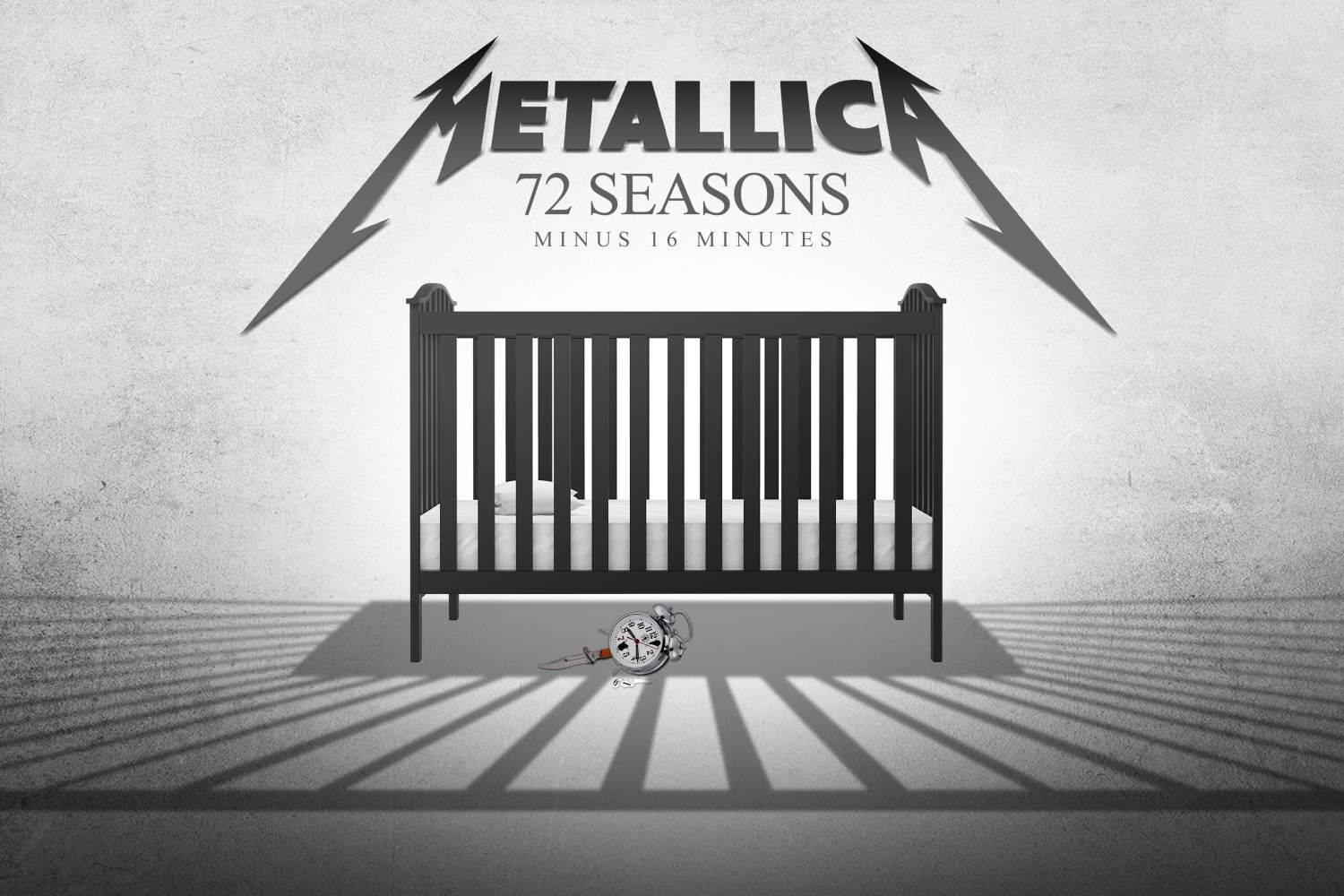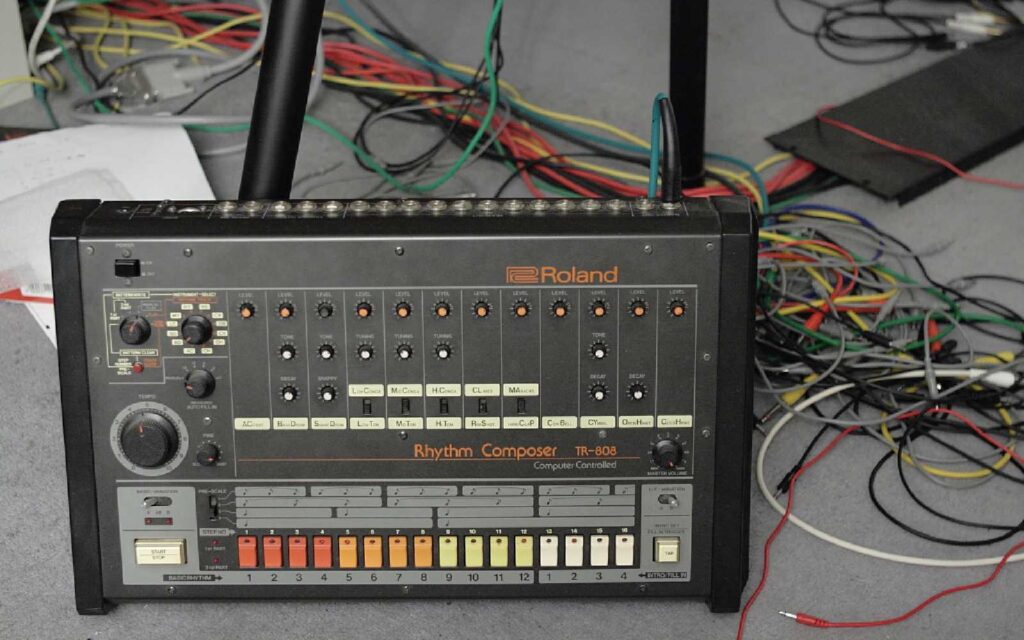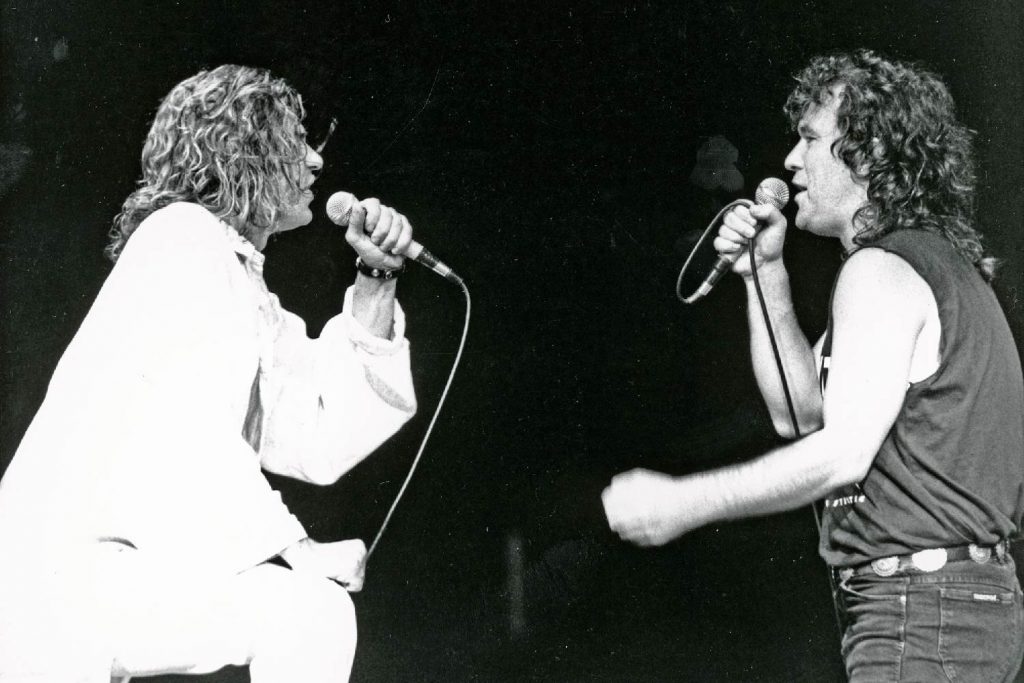An exploration of '72 Seasons', the eleventh studio album by legendary metal heavyweights Metallica.
“In anything at all, perfection is finally attained not when there is no longer anything to add, but when there is no longer anything to take away, when a body has been stripped down to its nakedness.” When he penned these words, Antoine de Saint-Exupéry probably didn’t know how oftquoted they would be over the following 70 years; how they’d wind up featured in ‘Quotable Quotes’ pages of supermarket magazines, copy-pasted into graphic designers’ online profiles, and printed onto motivational posters.
Read up on all the latest features and columns here.
After all, Monsieur Aintoine was discussing aeroplane engineering in the paragraphs immediately prior to this philosophical nugget. But despite its niche origin, this quotation had something in it that spoke to a wider audience and encapsulated a universal feeling. In a similar way, it would appear Papa Het didn’t think “Nothing Else Matters” would be pivotal in slingshotting his metal band to superstardom, instead predicting it to be “the last song anyone would really want to hear:
“It was a song for myself in my room on tour when I was bumming out about being away from home.”
I’d also wager that neither James, Lars, nor Kirk thought that the “Enter Sandman” riff would stir the viscera of basically every rock fan in the world. But hey, here we are; this is the timeline we live in, and Metallica are the biggest band in the world. And even though credit must ultimately go to the men themselves, their skyward journey has been aided by brilliant teams of technicians and artists who shaped them into that formidable, well-tuned machine that burst through the ceiling of their own genre. Among those teams were some A-list producers in Flemming Rasmussen, Rick Rubin, and the indomitable Bob Rock. And though Metallica’s history is littered with laughable production decisions (the St Anger snare, the curious case of the missing bass on …And Justice for All, and the egregious brickwalling of Death Magnetic), they were still a better band because of those producers. These were people who could tell them what to add and what to take away, and thereby improve the product.
Fast forward to 2023 and Metallica have released their second album since promoting former engineer Greg Fidelman to the role of co-producer, whose title appears to be merely nominal, because never have this band been in more dire need of an assertive person in the studio to crack the whip and reign things in.
Metallica’s 72 Seasons is a marathon listen, clocking in at 77 minutes – virtually the maximum amount of music you can fit onto a single compact disc. 2016’s Hardwired… to Self Destruct is of similar length, but one too many extended intros sees it spill over onto a second disc. And if we’re counting Lulu – and we are counting Lulu – then we get to add a further 87 minutes to the growing rap sheet of this Metallica-Fidelman collaboration. At this stage, they’re earning a growing reputation for releasing unfinished works, which is especially frustrating for fans who can see the rough suggestion of spectacular art left unfinished by craftsmen disinclined to ply the carving knife. Over the past decade, I’ve seen many of my all-time favourite bands commit this same error. On this occasion, the problems were too obvious and the target too tempting. Thusly compelled, I dragged 72 Seasons into Ableton Live and set about hacking it into pieces like an axe-wielding maniac and reassembling it like a mad scientist. The result is a leaner, meaner hour of music with just as much metal and a lot less drag.
Now, I understand that doing a meticulous cut-down of twelve over-long thrash metal songs doesn’t sound like everyone’s idea of a good time, but believe me when I say that chopping out 20 seconds of complete fart-arsing from the title track’s ludicrous intro was a cathartic experience unlike any other. Getting to the main riff in 30 seconds rather than 50 makes a huge difference to the listener’s stamina, especially when the opening composition consists mostly of single note alt-picking, open hihat bashing, and simplistic power chord riffs. It’s supposed to build things up and hint towards a payoff, but by dawdling for so long, it goes from titillating to irritating to bewildering. And why? To me it just implies indulgence and a lack of self-awareness. And that’s alright, every band runs into that. But that’s where a producer’s instincts should kick in, and they should put their foot down and say, “Gentlemen, I am bored”, with the full confidence of knowing that’s why they’re paid to be there.
Next up is “Shadows Follow”, which suffers from many of the same symptoms, featuring a snareheavy introduction that sounds exactly like the sort of meandering noise that beat us all into submission on Hardwired. And after the backlash that album received for precisely these antics, I can scarcely think of a more comedic way to open proceedings on 72 Seasons than with the intros of tracks #1 and #2. Once we get into things, both tracks have killer moments. James is raspy, menacing, and animated; the riffs have grunt to them; there are some tasty transitions that keep you guessing. It’s just that the highlights take forever to arrive, and they’re suffocated by the repetition that surrounds them. In the process of culling this repetition, it became apparent to me that the band have fallen into the habit of repeating almost every new arrangement they play. Even if it’s merely a variation of the same idea, it’ll usually get 4-8 bars all to itself.
Take “Screaming Suicide” for example. Why we need to hear the predictable wah-heavy intro twice, I don’t know. It only does a disservice to the very next wah-heavy intro riff that follows, making it less impactful. Things are dragged out further when the rest of the band drops out so that a single guitar can introduce all four bars of the main riff. Y’know, just so you know what you’re in for; we can’t have any surprises for you, not on a thrash metal record. We finally arrive at the drop, and we hear the main riff with its full-band backing. We get to hear it twice, actually! Then we get to hear it again after the verse and chorus. And then again again immediately after, but this time with a lead break. Rinse and repeat. This structure is so common on 72 Seasons, which consistently hampers the album. This is partly what made it such an enticing and rewarding editing project. I had a suspicion that I could remove two bars here, four bars there without affecting the songs’ continuity. It turns out I could do just that, often seamlessly, whilst improving the momentum of the songs, as predicted. It was a joy to be able to remove the padding that separated the sections of each song and discover how they interacted and built off one another once they were connected. It felt like I was unlocking the true album piece by piece, and the process became quite addictive.
I was also taken aback by how often the band interrupted the flow of their own songs with the inclusion of needless transitions or drawn-out sections that didn’t really need to be there. Perhaps not everyone will agree, but I found the chorus of “Screaming Suicide” to be greatly enhanced by the removal of the staccato sections immediately before the final line of the chorus. Each to their own, but I personally found it too abrupt and incongruous, and its disappearance was like a breath of fresh air. The chorus cruised along perfectly fine without it, like it had never been there.
Across the rest of the album, I continued shortening intros, cutting out measures of repeated riffs, bringing vocals in a lot sooner, dispensing with certain sections entirely, tightening up some of the more tiresome transitions, and occasionally removing the final pre-chorus or halving the first chorus. The deeper I got, the more I started to think to myself that Metallica haven’t put enough faith in the attention of their listeners, as if we’ll miss the details of the composition if they aren’t isolated, overemphasised, repeated, or introduced with an obvious cue. It all feels so deconstructed to me – too much so, to the point where the ideas aren’t co-operating and blending together in an interesting way. I contrast this with the songs from Death Magnetic, which are sometimes just as long, but more dense with ideas, and more kaleidoscopic in their arrangement, with sections overlapping and interlocking in a way that feels dynamic, alive, and interesting. There are variations that happen once and only once; harmonies just come out of nowhere; new riffs and movements announce themselves suddenly and provide thrills by doing so. This is the sort of thing that can’t be achieved with mere editing. This happens in the composition phase. This comes from a familiarity with your own songs and the constituent musical ideas within, so that you can rework them flexibly and fluently. This comes from rehearsing them as a unit, and discovering ways that they can be adapted and rewritten. And last but not least, it’s often the product of hearing the material so damn much that you tire of certain parts of them yourself, and you realise which parts shouldn’t be included, and which ones aren’t working well enough in their current form. In this scenario, you are the guinea pig, not the listener. You test the product before you inflict it upon your audience. In some ways, I feel like the expedience and power of modern production techniques has led to the shortening of the rehearsal phase, and therefore the neglect of QA/QC opportunities.
On Death Magnetic, the band were influenced by Rick Rubin to learn their material inside and out, getting the songs as close to their final form as possible, so that there was a clear boundary between the writing phase and the recording phase. And thank god they did, because the last time they blended writing and recording in the hope of creating spontaneous magic, it ended in St Anger, and we all know what happened there. Instead of writing 0 songs for Death Magnetic, they wrote 25, they selected 14 and demoed them, and then they finalised 10. Everything about this process was done right. The band entered the studio armed with their strongest material and prepared to track it. This means they would’ve had time and space to dedicate to fine tuning: so, rhythmic changes, melodic variations, harmonies, performance, vocal delivery, etc. The sort of stuff that can be the difference between a good album and a great album. To get a glimpse of the changes that were made, one need only listen to the demos (Demo Magnetic) recorded in the year before the final takes, and it’s plain to see the creative choices that led to an improved final product.
We are yet to hear demos from Hardwired or 72 Seasons, and I’m not even confident they exist. I think that Metallica were able to transfer their song ideas from their heads into the DAW session with very few steps in between. And I think that by facilitating that process, their producer robbed them of the chance to revisit their work and develop further drafts. I’m making a lot of guesses here, and I could be well off the mark, but everything about this album, structurally, makes it feel like a collection of very polished demos. For one thing, it shouldn’t have been so easy to edit. The boundaries between sections are so clean-cut, and the repeated sections are often so similar in timbre and feel that they are interchangeable. It feels inorganic and blocky. Ideas are packaged up and organised into their designated sections, like ready-made templates that can be swapped around and rearranged. If we were to liken it to an unfinished visual artwork, we might picture a very attractive line drawing marked with basic colour swatches, but no gradients, shading, or texture.
These aren’t things that can be fixed by some overzealous fan splicing up the final album master in his trial copy of Ableton. But nor should it get to that. Why am I and other random music enthusiasts booting up our laptops to make obvious improvements to the latest releases of the world’s biggest bands? Well, the very fact that we can is probably one of the key reasons why we feel the need to: it’s because the role of the producer has changed with technology. The fact that bands can now achieve so much through DIY means that they cut out the old-school producer as if they were a redundant middleman. Why not let the engineer wear that hat as well? And why not accept part of that role yourself? Especially when you’ve been in the game for decades. You should know enough by now, right? Wrong. It’s at that point that it’s probably more important.
You need someone to keep you honest, to keep you striving, and to keep you from resting on your laurels. Hearing the band talk about their producers in old interviews really crystallises the importance of the job, and it shows that Metallica once recognised it as well. James Hetfield summarised it cogently in an interview he gave during the time between St Anger and Death Magnetic, saying “We’ve learned so much from Bob Rock, but at a point, we were too enmeshed. And working with someone new, someone we might be able to respect, it’s tough. When you’re ‘at the top of your game’ and you’ve ‘done it all,’ you need someone to show you things. And hopefully [Rick Rubin’s] gonna show us some things we don’t know.”
I would love to see the band adopt that attitude again. They are a household name that’s so widely respected; they would have their pick of the litter when it comes to top-notch producers, all of whom would have a thing or two to show them – even if it’s just showing them a little opposition.
Keep up to date with all things Metallica here.







